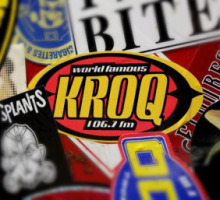
There was a time when 106.7 KROQ was an important part of my self-image. I was 14 years old, and kids were not just forming cliques, but subcultural scenes. A big part of that was what radio station you chose: Power 106 (hip hop), KIIS FM (pop) and KROQ (alternative rock.) There was overlap in the audiences of Power 106 and KIIS FM, as hip hop had become an accepted part of pop culture, while guitar music seemed too niche and white. So while the average person would listen to both Power 106 and KIIS, the ones who listened to KROQ listened to it exclusively. It was a strong enough in its cultural identity - a mainstream, sanitized vision of "alternative" - that that it inspired loyalty from its listeners.
Today, the importance of radio and even just the music monoculture is beyond dead and buried, yet the thing still remains on the dial of my car's unused radio. The way stations have dealt with the splintering and liberation of music has been a bit like watching a fish flail in a boat. They've propped up apps like iHeartRadio to maintain their technological relevance, and I suspect the nostalgic resurgence of bands like Incubus and Linkin Park goes hand in hand with their aim of remaining cultural (and therefore economic) forces.
But whatever KROQ once was to me as a kid will probably never be again. Their playlist these days confirms it: It's a confused mash up of today's youth culture with one desperate, gnarled hand still clinging to the alt-rock it helped define a couple decades ago. They bet the whole game on that post-Nirvana "Alternative Rock" label, and they rode that wave high and well for many years until it crashed upon the shores of the internet. All stations had to deal with new competition in music availability, but only KROQ had to deal with their audience's tastes shifting with increased music access.
